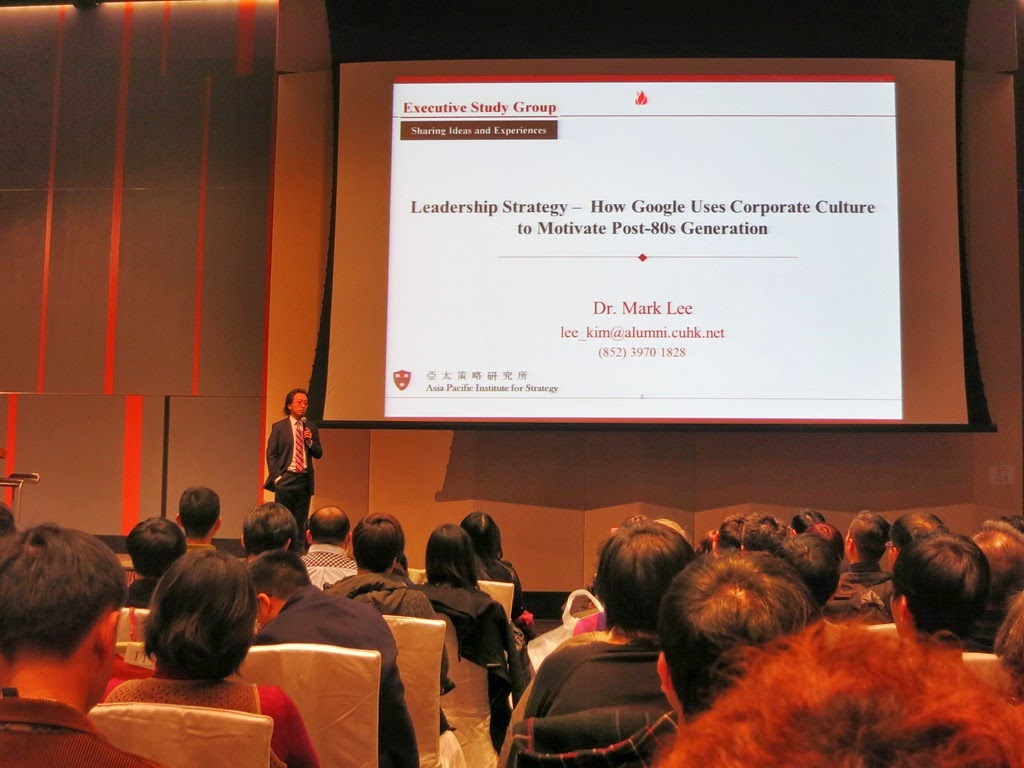I took a photo with Dr. Mark Lee for memory during registration.
Before the seminar, Mr. Antony Kwong (Assistant Mgr, Marketing, HKSTP) introduced HKSTP new identity through video play and HKSTP new logo.
Dr. Mark Lee briefed the purpose of Executive Study Group (ESG) and he quoted Steve Job statement “Creativity is connecting things.” Then he formed Alumni Club of Exclusive Classes for Directors. He proposed to brainstorming inside your company. Then Dr. Mark Lee briefed the content of seminar included "The Most Admired Company”, “Management Ignorance on Corporate Culture”, “Office Environment Strategy”, “Organization Structure Strategy”, “Working Style Strategy” and “Brainstorming Session”.
Dr. Lee said Google was the most admired company which established 17 years and their stock price was more that HSBC plus IBM. Moreover, their employees were so young (median age of just 29). In addition, 84% of their employees had a high level of job satisfaction! What is the secret in their culture? Then Dr. Lee told us most of management ignorance on Corporate Culture because of shortsighted in business. But Google is different. During IPO, they drafted a “Letter form the Founders” with four key phases included “Long term focus”, “Serving end users”, “Don’t be evil” and “Making the world a better place”. Eventhough it rejected by the Securities and Exchange Commission initially and barriers from Lawyers and Bankers. The founders insisted to their Long Term Focus and succeed for IPO at the end.
Dr. Mark Lee introduced the three of Corporate Culture Strategy of Google included “Office Environment Strategy”, “Organization Structure Strategy” and “Working Style Strategy”.
Office Environment Strategy
Google created an environment similar to a university and one of famous items was its free gourmet cafeterias.
i) It works as Petri Dish for Idea / Creativity Fostering.
ii) The second thing Google was No Ego to keep people crowded with same privileges which enhanced the communication for creating ideas. The large space was designed as playground such as soccer game in lunchtime.
iii) Google had a concept “Live Together” to enhance Knowledge Sharing.
iv) They allowed “Messiness” for Self-Expression.
The Google’s “AdSense” was invented one day by a group of engineers from different teams who were playing pool in the office.
Organization Structure Strategy
i) Google’s strategy was by sufficient subordinates to Prevent Micromanagement. (e.g. New Version on The Rule of Seven: a minimum of seven direct reports; Project team sample with 15 to 20 direct report)
ii) Don’t use Business Units because of unit benefit over corporate benefit. No Silos and Number Games, so as to enhance Customer Productivity.
Then Dr. Mark Lee quoted Jeff Bezos (Founder Amazon) that he used Small Teams in which using “two-pizza team” rule (Teams are small enough to be fed by two pizzas). Then he also quoted Bill Campbell (Former CEO, Intuit) that “your title makes you a manager. Your people make you a leader.” So we needed to find the Biggest Impact Person as Leader in condition that this person’s own interests did not larger than corporate interests. Moreover, Dr. Lee told us old sayings “If you want something done, give it to a busy person”. Lastly, he discussed Product Experts at Senior Level. A good rule of thumb is that at least 50% of the people at the table should be experts during staff meeting.
Working Style Strategy
TGIF ("Thank God It's Friday.") is a Google’s weekly all-hands meeting, where employees ask questions directly to the company’s top leaders and other executives about any number of company issues.
i) They focused on Work Enjoyment with a sense of humor. (e.g. CEO dancing “Gangnam Style” with PSY.
ii) Work-Life Balance indicated Work and Life are not separated. People overworked in a good way with too many interesting things to do both work and at home.
iii) The “Yes” Culture mean “Don’t Easy to Setup Gates”. This style named Freedom with Less Approvals.
iv) Questioning the Comfort Zone is Self-Reflection. Here ask two questions: “What is the culture that defines your company today?” and “What problems has this culture caused with the business?”
v) Dissent Obligation is a Speak-Up Culture to demolish the culture of fear.
vi) Integrity demonstrated in the Letter form the Founders such as “Don’t Be Evil”.
In Brainstorming Session, Dr. Lee asked two questions below:
- Which concept or case is the most impressive to you?
- Why? And how does it relate to your experience?
Reference:
HKSTP Events & Seminar - http://www.hkstp.org/en-US/News-Media-Events/Events-Seminars.aspx#.VN4WgfmUchA
Asia Pacific Institute for Strategy Limited (亞太策略研究所有限公司) – www.apifs.org (Remark: It redirect to the online survey.)









沒有留言:
發佈留言